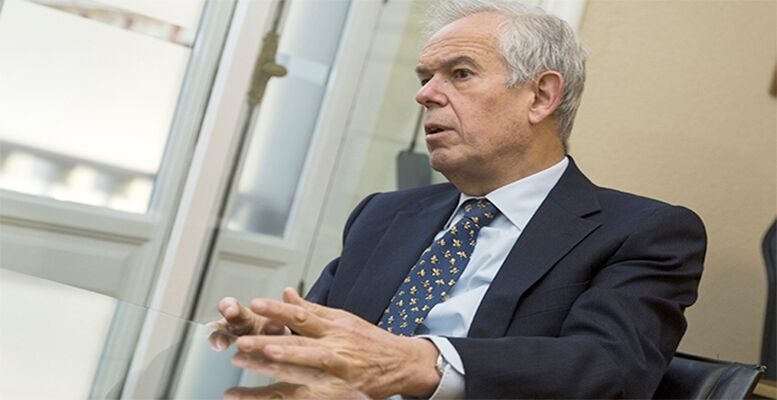Ignacio Gómez-Montejo is the director of ICR Institutional Investment, manager of Equity Arbitrage, the only fund of funds Hedge Fund which is continuing to sell products in this category in Spain. He knows very well Spanish investors behaviour given his 25 years long experience in the financial sphere.
The fund manager is about to complete its 20th year and its only fund, which had a different name and strategy until 2009, has always met its annual objective of offering an annual yield of the Euribor plus 5%, without exceeding 4% volatility.
Q: What does the institutional investor map look like in Spain?
A: Before, the map was very bancarised and now it’s more or less the same, perhaps a bit less so. Apart from the banks, there are the insurance companies, pension funds – which have had a very limited development for a variety of reasons – and the family-offices, which are expanding in Spain.
Q: And there are also the venture capital and private equity funds and the rest…
A: Yes, but I have the impression that these are not so developed in Europe – with the exception of the UK – as they are in the US. And in fact there are some very interesting projects which are having problems in finding financing of this kind. There is the Alternative Stock Market, but it’s not very developed.
Q: Is there a difference between how institutional investment is structured in Spain and in more developed financial markets?
A: In Spain, institutional investors have always been too conservative. Even the most basic financial concept is difficult to understand. Despite the low interest rate environment, these investors are not capable of taking even a little more risk.
Q: So not even low rates have softened this conservative view?
A: From what I can see, this tradition has hardly ever been broken. Furthermore, there are many professionals qualified in institutional fund management who are also subject to what we call “the career risk”. For example, in an insurance company, if a fund manager invests 2% in a determined product and it goes well, they will maybe give him a pat on the back. But if it goes badly, they fire him. It’s said that no-one gets fired for buying computers from IBM, even though there are other products which are more innovative or better. Sometimes people say to me “I like your product a lot, but I have to explain it to my board of directors and they won’t authorise it.”
Q:How much of this conservatism is due to legal hurdles as far as the investments are concerned, and how much to the financial culture of the big corporations?
A: Both things. In pension funds, above all, there is the legal framework. With others, it’s a problem of financial culture, but not of the fund managers but of some of the people on the board who have been there for many years and don’t want to move away from public debt or property. And look what has been invested in the property sector in Spain, one which the institutional investor considers to be safe but which is completely illiquid. A market with huge entry and exit costs and with almost the same amount of risk as the stock market.
Q: What does ICR do and for whom?
A: It was set up in 1998, so it is almost celebrating 20 years in existence. We come from FG and Merril Lynch, where the best clients were hedge funds. We thought that if we chose the best hedge funds in the world, put a basket of them together and create an invsetment vehicle, we could offer a financial product with a good yield but very little risk. Clients pay 20 basis points in management to obtain a yield which excedes the risk. We do this by looking for the best fund managers, taking away or controlling their risk and demanding annual yields of 5, 7, and 8% from them. But without any market risk – although there is always a marginal amount – and so, if the market falls, for example, 20%, that this doesn’t affect the fund. The annual yield target is the Euribor plus 5%, without exceeding 4% volatility, something which we have met year after year.
Q:How does the fund work?
A: The fund is called Equity Arbitrage and encompasses 15 hedge funds. Four of these are Chinese: China is ideal for a hedge fund because it’s a big market, very illiquid, very inefficient, where there are difficulties in distributing information and where you can do well if you carry out a good fundamental analysis. We have been there for many years and it has gone very well for us. In addition, we have 4 quantitative funds, because the developed markets are increasingly more efficient: these funds choose stocks using very complex data. For example, we are invested in a hedge fund which has 1,000 employees, the majority of whom are statisticians and mathematicians who look for inefficiences in the markets. They even analyse what investors look up in Wikipedia, which can also be considered as information or an indication. Of course there is the traditional fundamental analysis, but that is very exploited and produces a very low yield. And then we have funds based on funadamental analysis, but which are very specialised: one for Italy; another for Exploration and Production in north America – the fund managers are Texans and know every well in the industry. And because they are small funds they can react quicker than the big firms on Wall Street -; Healthcare in the US, but only Biotechnology, which is managed by a doctor – it’s much easier to transform a doctor into a financial analyst than the other way round -; US cyclical stocks; another which is only focused on Spain and Portugal; another in London which looks at Europe…





